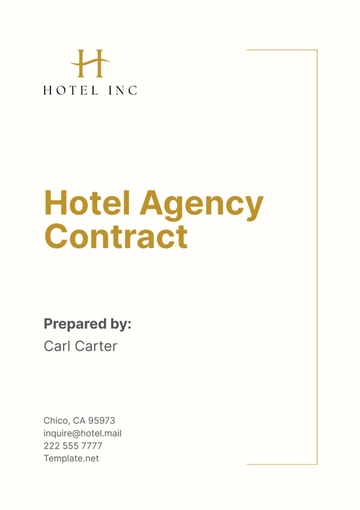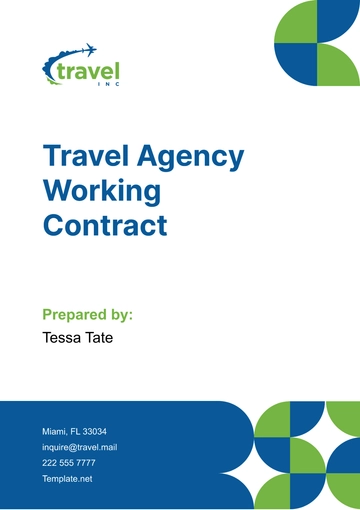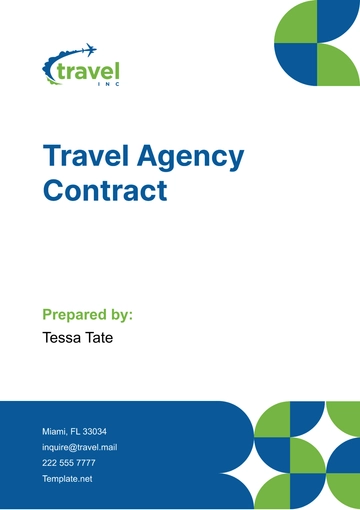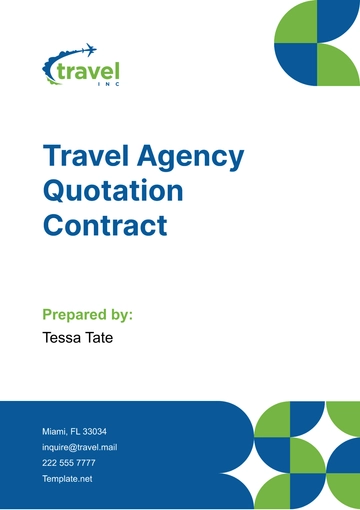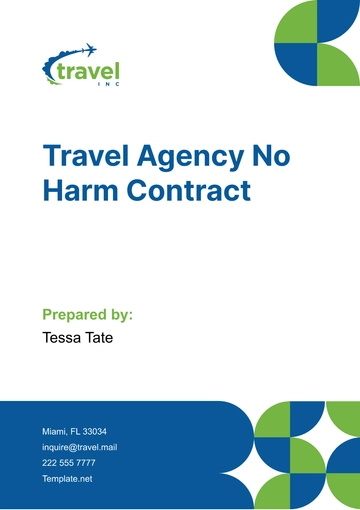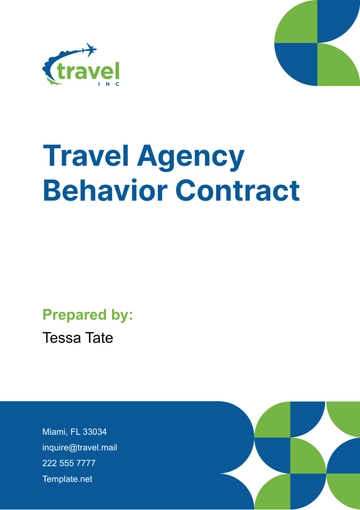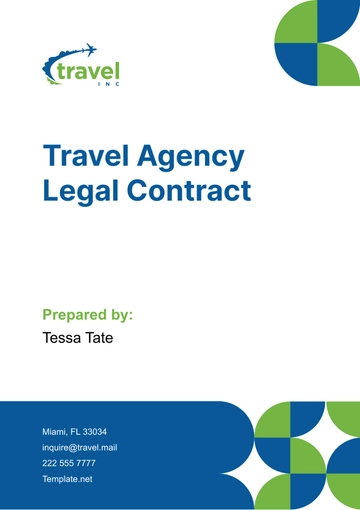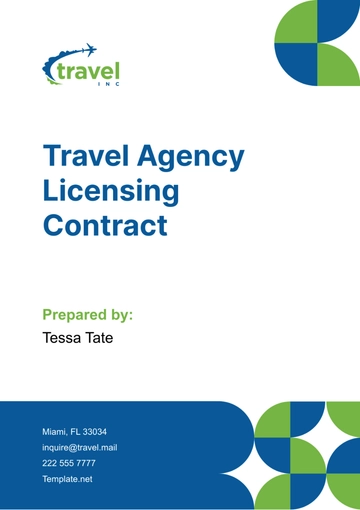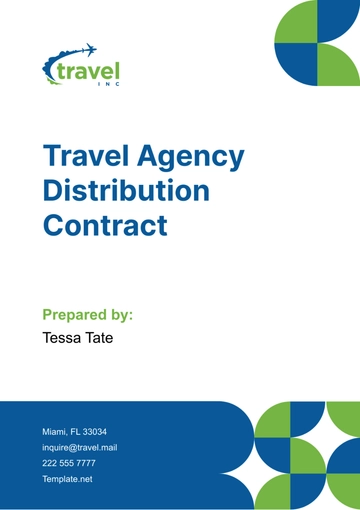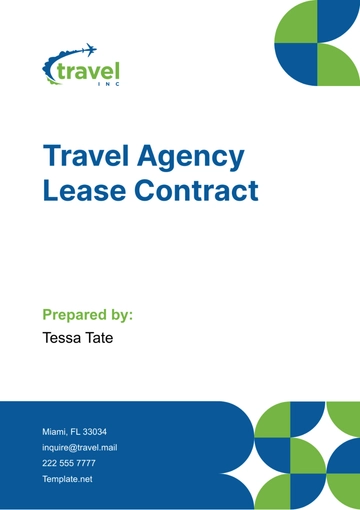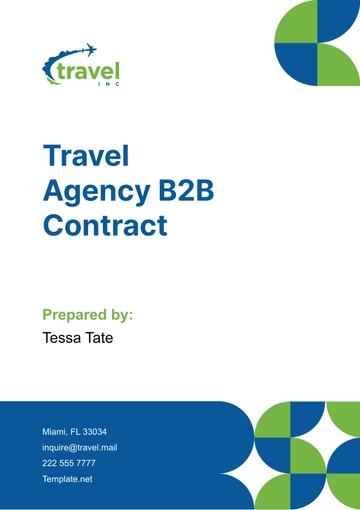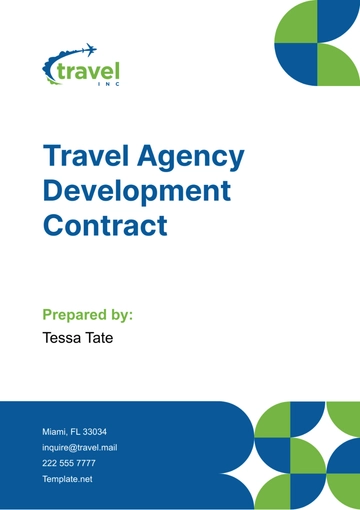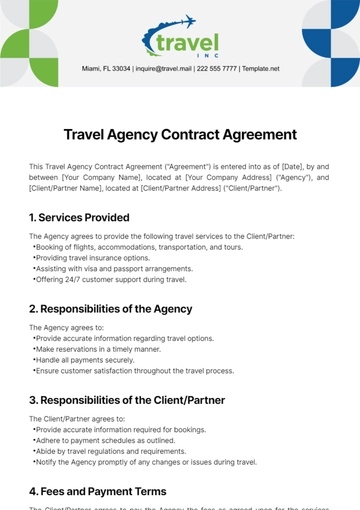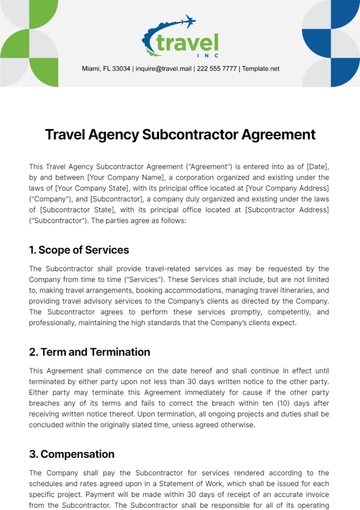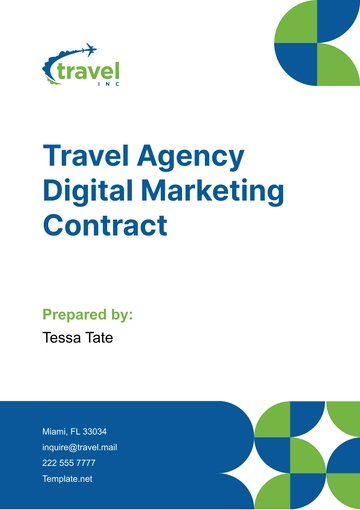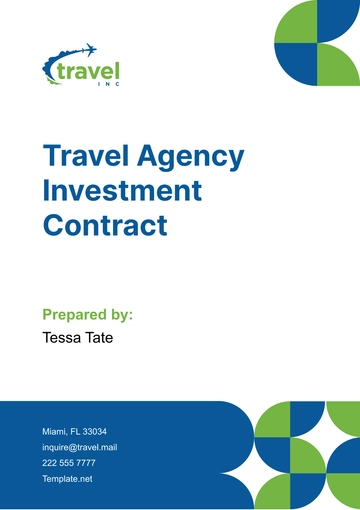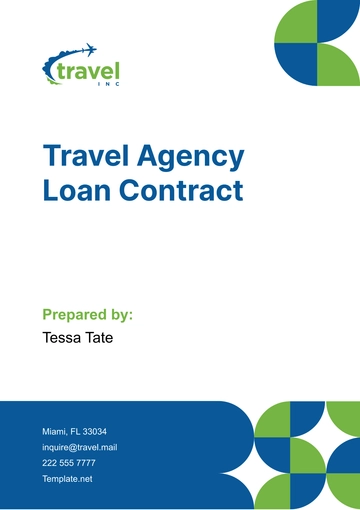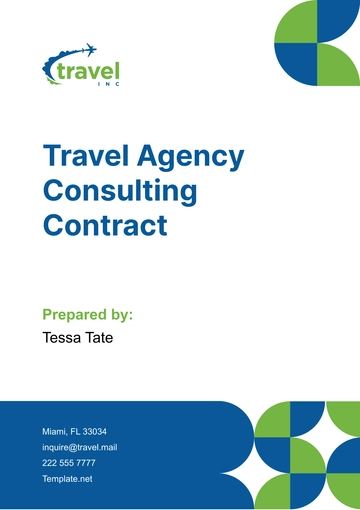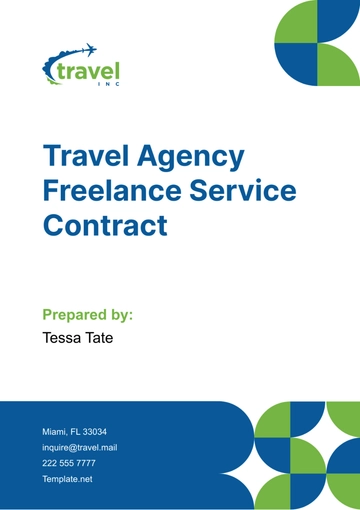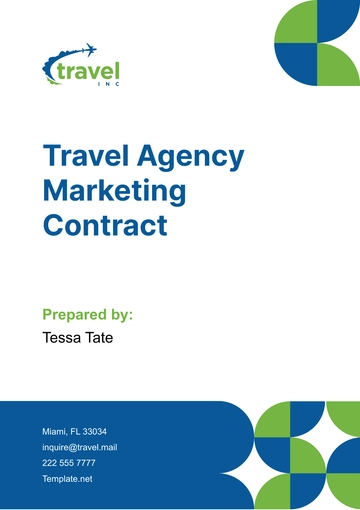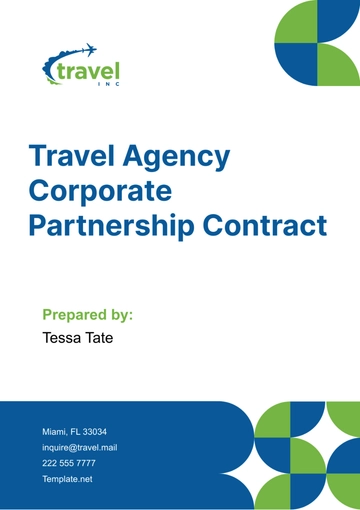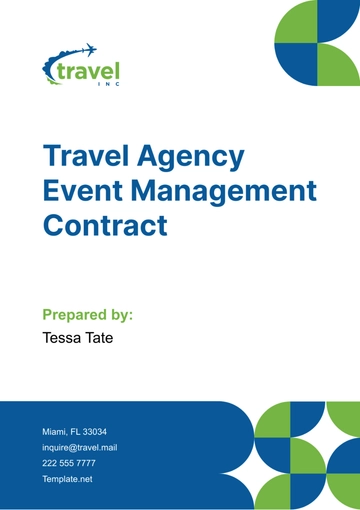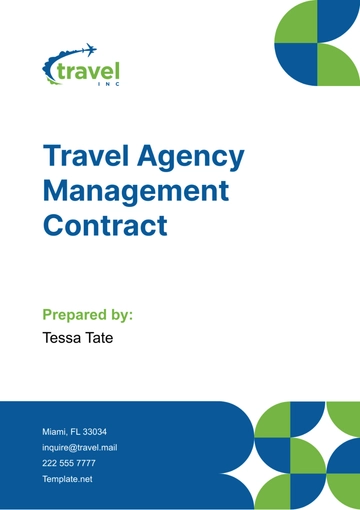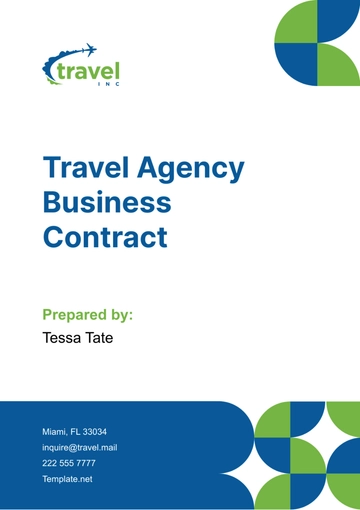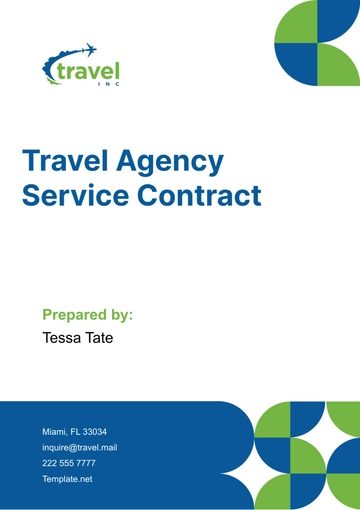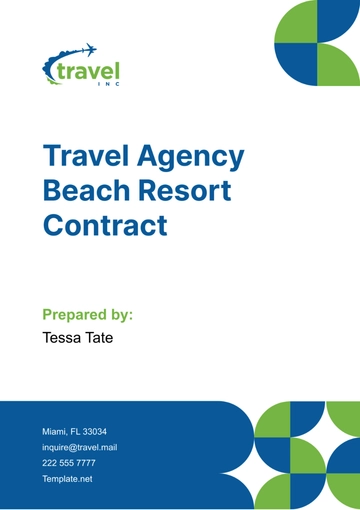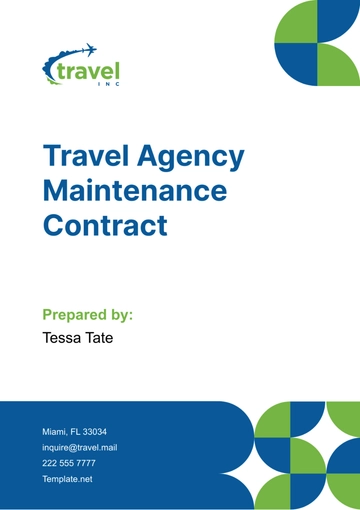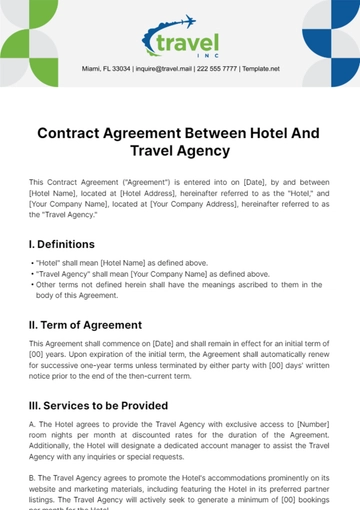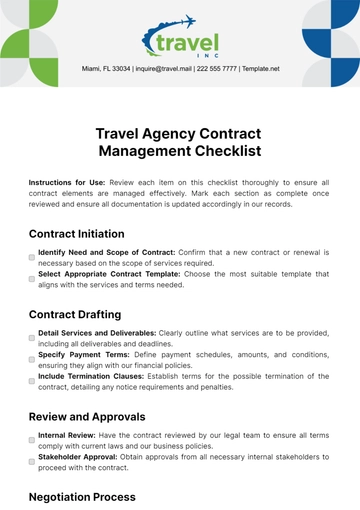Free Travel Agency Tour Guide Employment Contract
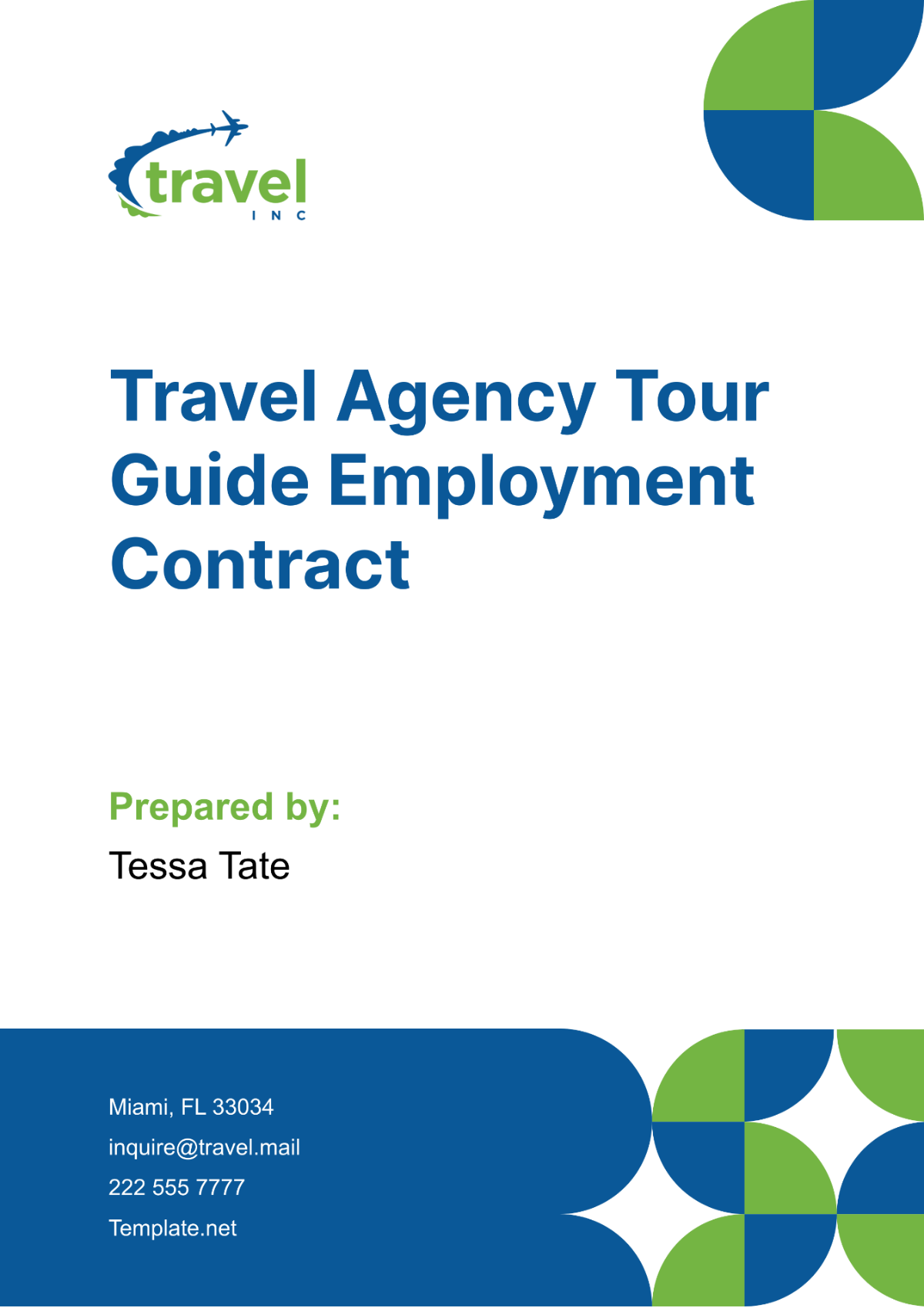
I. The Parties
This Employment Contract ("Contract") is made as of [Month Day, Year], by and between [Your Company Name], an agency incorporated and existing under the laws of [State Name] with its principal office located at [Your Company Address] ("Agency"), and [Tour Guide's Name], an individual residing at [Tour Guide’s Address] ("Tour Guide"), collectively referred to as the ("Parties").
WHEREAS, the Agency is engaged in the business of providing travel and tour services to clients and requires the service of a qualified tour guide;
WHEREAS, the Tour Guide represents that they have the necessary qualifications, experience, and abilities to provide guiding services for the Agency;
WHEREAS, the Agency desires to employ the Tour Guide on these terms and conditions set forth herein;
NOW, THEREFORE, in consideration of the mutual covenants and promises herein contained, the parties agree as follows:
II. Employment
A. Agreement to Employ
Employment Offer: The Agency extends an offer of employment to the Tour Guide, acknowledging their unique skills and qualifications that make them a valuable addition to the team.
Acceptance of Offer: The Tour Guide accepts the offer of employment, expressing their willingness to contribute their skills and expertise to the Agency.
Mutual Agreement: Both parties mutually agree to the terms of employment, establishing a professional relationship based on mutual respect and understanding.
Contractual Obligation: The employment offer and its acceptance are bound by this Contract, ensuring both parties adhere to their respective obligations.
Employment Commencement: The employment commences from the date first written above, marking the beginning of the Tour Guide’s professional journey with the Agency. This date signifies the start of the Tour Guide’s responsibilities and their commitment to fulfilling their role.
B. Agreement to Serve
Role Acceptance: The Tour Guide accepts the role of a tour guide to provide high-quality tour services to the Agency’s clients. This acceptance demonstrates the Tour Guide’s understanding of their role and their readiness to perform their duties.
Service Commitment: The Tour Guide commits to performing their duties to the best of their abilities, striving to meet and exceed the Agency’s expectations.
Upholding Standards: The Tour Guide agrees to uphold the standards of the Agency, contributing to its reputation and success. This involves adhering to the Agency’s policies and procedures, maintaining professionalism at all times, and striving for excellence in all tasks.
Continuous Improvement: The Tour Guide commits to continuous learning and improvement, aiming to enhance their skills and provide better services over time.
Client Satisfaction: The Tour Guide prioritizes client satisfaction, aiming to provide memorable and enjoyable tour experiences for all clients. This involves understanding the clients’ needs and preferences, tailoring the tour experience to meet these needs, and ensuring the clients’ safety and enjoyment at all times.
III. Term
A. Commencement of Contract
Start Date: The Contract will commence on the date first written above, marking the official start of the Tour Guide’s employment with the Agency.
Acknowledgement of Start Date: Both the Agency and the Tour Guide acknowledge this start date and agree to adhere to the terms and conditions of the Contract from this point forward.
Record of Start Date: The start date will be recorded in the Agency’s employment records, providing a reference point for employment duration, benefits eligibility, and other employment-related matters.
Orientation and Onboarding: Upon commencement of the Contract, the Tour Guide will undergo an orientation and onboarding process to familiarize themselves with the Agency’s operations, policies, and expectations.
Probationary Period: The first few months of the Contract may serve as a probationary period, during which the Tour Guide’s performance will be closely monitored and evaluated to ensure they meet the Agency’s standards.
B. Termination of Contract
Notice of Termination: The Contract may be terminated by either party with at least [30] days’ prior written notice. This notice period allows both parties sufficient time to manage the transition and minimize disruption to the Agency’s operations.
Reasons for Termination: Reasons for termination may include, but are not limited to, breach of contract, unsatisfactory performance, misconduct, or changes in the Agency’s operational requirements.
Final Pay and Benefits: Upon termination, the Tour Guide will receive their final pay and any accrued benefits in accordance with the Agency’s policies and applicable labor laws.
Return of Agency Property: Upon termination, the Tour Guide is required to return all Agency property in their possession, including but not limited to, equipment, documents, and identification cards.
Post-Termination Obligations: Even after termination, certain obligations remain, such as the duty to maintain confidentiality and respect the non-compete clause, as outlined in this Contract.
IV. Duties and Responsibilities
A. Planning Tour Itineraries
Itinerary Development: Developing comprehensive and engaging tour itineraries is a key responsibility. This involves researching destinations, planning routes, and scheduling visits to attractions.
Client Preferences: Each tour itinerary is tailored to the preferences and interests of the clients. This ensures a personalized travel experience.
Logistical Arrangements: Handling logistical arrangements for the tours is part of the role. This includes booking transportation, arranging accommodation, and planning meals.
Contingency Planning: Preparing contingency plans for unexpected situations or changes in the itinerary ensures that tours can proceed smoothly even in the face of unforeseen circumstances. This could include changes in weather, closures of attractions, or delays in transportation.
Continuous Improvement: Based on client feedback and personal observations, tour itineraries are continuously improved. This ensures that the tours are always improving and evolving to meet the needs of the clients.
B. Providing Information and Guidance
Knowledge Sharing: Sharing knowledge about the destinations and attractions enhances the clients’ understanding and appreciation of the places they visit. This includes historical facts, cultural insights, and interesting anecdotes.
Guidance: Guiding the clients through the destinations and attractions. It is about ensuring they have a safe and enjoyable experience, managing time at each attraction, and addressing any concerns or questions the clients may have.
Communication: Clear and effective communication with the clients throughout the tour is maintained. This includes providing updates about the itinerary, explaining the rules and guidelines at each attraction, and responding to the clients’ queries in a timely and professional manner.
Problem Solving: Any problems that arise during the tour are solved promptly. This requires quick thinking, resourcefulness, and a calm demeanor.
Client Engagement: Engaging with the clients in a friendly and respectful manner fosters a positive atmosphere and enhances the overall tour experience. This involves interacting with the clients, listening to their stories, and sharing in their excitement and wonder.
C. Ensuring Safety and Enjoyment
Safety Measures: Safety of the clients is prioritized, with necessary precautions taken and safety guidelines adhered to at all times. This includes ensuring that the clients follow the rules at each attraction, monitoring the clients’ health and well-being, and responding promptly to any emergencies.
Enjoyable Experience: Efforts are made to create an enjoyable experience for the clients. This involves maintaining a positive attitude, facilitating fun activities, and meeting the clients’ needs.
Client Satisfaction: Regular check-ins with the clients ensure they are satisfied with the tour. This includes asking for feedback, addressing any complaints, and making adjustments to the itinerary if necessary.
Professional Conduct: Professionalism is maintained at all times, representing the Agency in a positive light and upholding its reputation. This includes treating everyone with respect, adhering to the Agency’s code of conduct, and maintaining a high standard of service.
Continuous Learning: Skills are continuously improved to provide better services to the clients. This includes staying updated on industry trends, attending training programs, and seeking feedback for self-improvement.
V. Compensation
A. Monthly Salary
Salary Amount: The Tour Guide will receive a monthly salary of [$3,000]. This competitive salary recognizes the skills, experience, and dedication required for the role of a tour guide.
Payment Schedule: The salary will be paid on the [last day] of each month. This regular payment schedule ensures that the Tour Guide receives their compensation in a timely manner.
Salary Review: The Agency commits to conducting regular salary reviews. These reviews will take into account factors such as the Tour Guide’s performance, the cost of living, and industry standards.
Tax Deductions: All applicable taxes will be deducted from the salary as per the law. The Agency will provide the Tour Guide with a clear breakdown of these deductions.
Pay Slips: The Tour Guide will receive monthly pay slips detailing their earnings and deductions. This ensures transparency in the payment process.
B. Performance-Based Incentives
Incentive Plan: In addition to the monthly salary, the Tour Guide may be eligible for performance-based incentives. These incentives are designed to reward exceptional service and client satisfaction.
Performance Metrics: The performance of the Tour Guide will be evaluated based on various metrics such as client feedback, adherence to schedules, and ability to handle unforeseen situations.
Incentive Calculation: The amount of the incentive will be calculated based on the Tour Guide’s performance metrics. The better the performance, the higher the incentive.
Incentive Payout: Performance-based incentives will be paid out on a quarterly basis. This allows the Agency to accurately assess the Tour Guide’s performance over a significant period.
Incentive Review: The Agency will regularly review and update the incentive plan to ensure it continues to motivate and reward high performance.
VI. Confidentiality
A. Non-Disclosure During Contract Term
Confidentiality Obligation: During the term of this Contract, the Tour Guide is obligated to maintain the confidentiality of the Agency’s business affairs. This includes, but is not limited to, client information, business strategies, marketing plans, and proprietary methodologies.
Protection of Information: The Tour Guide will take all necessary steps to protect the confidential information from unauthorized access, use, or disclosure. This includes following all of the Agency’s security protocols and procedures.
Unauthorized Disclosure: The Tour Guide will immediately notify the Agency if they become aware of any unauthorized disclosure of the confidential information. The Tour Guide will cooperate fully with the Agency to minimize the impact of such a disclosure.
Use of Information: The Tour Guide will use the confidential information solely for the purpose of performing their duties under this Contract. They will not use the information for their own benefit or the benefit of any third party.
Return of Information: Upon the termination of this Contract, or at any other time upon the request of the Agency, the Tour Guide will return all confidential information in their possession.
B. Non-Disclosure After Contract Termination
Continued Obligation: Even after the termination of this Contract, the Tour Guide’s obligation to maintain the confidentiality of the Agency’s business affairs continues.
Post-Termination Use of Information: After the termination of this Contract, the Tour Guide will not use any of the Agency’s confidential information for any purpose. They will also refrain from disclosing the information to any third party.
Return of Information: Upon the termination of this Contract, the Tour Guide will return all confidential information to the Agency. They will also delete any copies of the information in their possession.
Survival of Clause: This confidentiality clause will survive the termination of this Contract. This means that the Tour Guide’s obligation to maintain confidentiality will continue even after the Contract has ended.
Legal Remedies: If the Tour Guide breaches this confidentiality clause, the Agency may take legal action against them. This could include seeking damages for any loss suffered as a result of the breach.
VII. Non-Compete
A. Non-Compete Period
Duration of Non-Compete: The non-compete period will last for [2] years following the termination of this Contract. This period has been chosen to protect the Agency’s business interests while being fair and reasonable to the Tour Guide.
Start of Non-Compete: The non-compete period begins immediately upon the termination of this Contract. This means that the Tour Guide must refrain from engaging in competing business activities from the moment their employment with the Agency ends.
Scope of Non-Compete: The non-compete clause applies to any business that competes with the Agency. This includes, but is not limited to, other travel agencies, tour operators, and tourism-related businesses.
Geographical Scope: The non-compete clause applies regardless of geographical location. This means that the Tour Guide cannot engage in competing business activities.
End of Non-Compete: At the end of the non-compete period, the Tour Guide is free to engage in any business activities, including those that compete with the Agency.
B. Prohibited Activities
Direct Competition: During the non-compete period, the Tour Guide cannot engage in any business that directly competes with the Agency. This includes starting their own travel agency or working for another travel agency.
Indirect Competition: The Tour Guide is also prohibited from indirectly competing with the Agency. This includes providing consulting services to a competing business or investing in a competing business.
Solicitation of Clients: The Tour Guide cannot solicit the Agency’s clients for the purpose of a competing business. This includes using the Agency’s client list or any other confidential information to attract clients to a competing business.
Solicitation of Employees: The Tour Guide cannot solicit the Agency’s employees for the purpose of a competing business. This includes encouraging the Agency’s employees to leave their employment and join a competing business.
Use of Confidential Information: The Tour Guide cannot use any of the Agency’s confidential information for the purpose of a competing business. This includes using the Agency’s business strategies, marketing plans, or proprietary methodologies to gain a competitive advantage.
VIII. Termination
A. Termination Notice
Notice Requirement: Either party may terminate this Contract by providing written notice to the other party. This ensures a formal and clear communication of the intention to end the employment relationship.
Notice Period: The notice period is [15] days. This will allow both parties sufficient time to manage the transition and minimize disruption to the Agency’s operations. During this period, the Tour Guide is expected to continue performing their duties unless otherwise instructed by the Agency.
Receipt of Notice: Upon receipt of the termination notice, the other party will acknowledge the notice and commence the necessary procedures for termination.
B. Return of Property and Confidential Information
Return of Property: Upon termination, the Tour Guide is required to return all property belonging to the Agency. This includes any equipment, uniforms, identification cards, or documents that were provided for the purpose of performing their duties.
Return of Confidential Information: The Tour Guide must also return all confidential information belonging to the Agency. This includes any documents, files, or data that contain information about the Agency’s operations, clients, or business strategies.
Deletion of Digital Information: In addition to returning physical items and documents, the Tour Guide is required to delete any digital copies of the Agency’s confidential information that they may have stored on their personal devices.
Final Check: The Agency will conduct a final check to ensure that all property and confidential information have been returned.
Legal Obligations: The Tour Guide’s obligation to return the Agency’s property and confidential information is not only a contractual requirement but also a legal obligation. Failure to comply may result in legal action.
IX. Governing Law
A. Applicable Law
Jurisdiction: The laws of [State Name] will govern this Contract. This means that any legal disputes arising from this Contract will be resolved in accordance with [State Name] law, regardless of where the parties are located.
Legal Compliance: Both the Agency and the Tour Guide agree to comply with all applicable laws and regulations of [State Name]. This includes labor laws, business laws, and any other laws relevant to the duties and responsibilities outlined in this Contract.
Legal Interpretation: Any legal interpretation of this Contract will be based on [State Name] law. This ensures that the terms and conditions of this Contract are interpreted consistently and fairly.
Legal Disputes: In the event of a legal dispute, the courts of [State Name] will have jurisdiction. This means that any legal proceedings related to this Contract will take place in [State Name].
Legal Representation: Both parties have the right to legal representation in any legal proceedings related to this Contract. This ensures that both parties have the opportunity to present their case and protect their rights.
B. Contract Interpretation
Contract Language: This Contract is written in English, and all communications related to this Contract will be conducted in English. Any translations of this Contract must be agreed upon by both parties and will be used for reference purposes only.
Understanding of Terms: Both parties confirm that they understand the terms and conditions of this Contract. If there is any confusion or disagreement about the terms, the parties agree to seek clarification or legal advice.
Amendments: Any amendments to this Contract must be in writing and signed by both parties. This ensures that any changes to the Contract are mutually agreed upon and legally binding.
Waiver: A waiver of any term or condition of this Contract must be in writing and signed by the party waiving its rights. A waiver will not affect the parties’ rights and responsibilities under the rest of the Contract.
Severability: If any term or condition of this Contract is found to be illegal or unenforceable, the rest of the Contract will remain in effect. The parties will work together to replace the illegal or unenforceable term with a legal and enforceable one.
X. Dispute Resolution
A. Dispute Settlement
Arbitration: Any disputes that arise from this Contract will be settled through arbitration. This is a process where a neutral third party, known as an arbitrator, makes a decision about the dispute.
Arbitration Rules: The arbitration will be conducted under the Rules of the [Arbitration Name]. These rules provide a framework for the arbitration process and ensure that it is fair and impartial.
Arbitration Process: The arbitration process will involve the submission of evidence by both parties, a hearing where both parties can present their case, and a decision by the arbitrator.
Binding Decision: The decision of the arbitrator will be final and binding on both parties. This means that both parties must accept the decision and cannot appeal it to a court.
Enforcement of Decision: If a party fails to comply with the arbitrator’s decision, the other party can enforce the decision through a court. The court has the power to order the non-complying party to comply with the decision.
B. Arbitration Procedure
Initiation of Arbitration: If a dispute arises, the party wishing to initiate arbitration must send a written notice to the other party. This notice must describe the nature of the dispute and the remedy sought.
Selection of Arbitrator: The parties will jointly select an arbitrator. If they cannot agree on an arbitrator, one will be appointed under the Rules of the [Arbitration Name].
Arbitration Hearing: The arbitrator will hold a hearing where both parties can present their evidence and arguments. The hearing can be held in person, by telephone, or online, depending on the circumstances.
Arbitrator’s Decision: After considering all the evidence and arguments, the arbitrator will make a decision. The decision will be provided in writing and will explain the reasons for the decision.
Costs of Arbitration: The costs of the arbitration, including the fees of the arbitrator, will be shared equally by the parties, unless the arbitrator decides otherwise.
XI. General Provisions
A. Validity of Provisions
Severability: If any provision of this Contract is found to be invalid or unenforceable, that provision will be severed from the Contract. The remaining provisions will continue to be valid and enforceable. This ensures that the rest of the Contract remains in effect even if one part of it is found to be invalid.
Replacement of Invalid Provisions: The parties agree to work together to replace any invalid or unenforceable provision with a valid and enforceable one. The replacement provision will, as far as possible, achieve the same economic, legal, and commercial objectives as the invalid or unenforceable provision.
Effect of Invalid Provisions: The invalidity or unenforceability of a provision will not affect the validity or enforceability of the rest of the Contract. This means that even if a court finds one provision of this Contract to be invalid or unenforceable, the rest of the Contract will still remain in effect.
Interpretation of Provisions: All provisions of this Contract will be interpreted in a manner that makes them valid and enforceable. If there is any doubt about the interpretation of a provision, the parties agree to seek legal advice.
Amendment of Provisions: Any amendments to the provisions of this Contract must be in writing and signed by both parties. This ensures that any changes to the Contract are mutually agreed upon and legally binding.
B. Entire Agreement
Complete Agreement: This Contract constitutes the entire agreement between the parties regarding the employment of the Tour Guide. It replaces and supersedes any previous agreements, understandings, or representations.
Consistency with Other Documents: If there is any inconsistency between this Contract and any other document, this Contract will prevail unless the other document expressly states otherwise.
Amendment of Agreement: This Contract can only be amended in writing and signed by both parties. Any amendments will form part of this Contract.
Understanding of Agreement: Both parties confirm that they understand this Contract and agree to its terms. They acknowledge that they have had the opportunity to seek legal advice before signing this Contract.
Execution of Agreement: This Contract is executed by the parties as a legally binding agreement. It is effective from the date first written above.
XII. Signature
IN WITNESS WHEREOF, the parties hereto have executed this Employment Contract as of the day and year first above written.
Agency

[Authorized Representative Name]
[Your Company Name]
Date: [Month Day, Year]
Tour Guide

[Tour Guide's Name]
Date: [Month Day, Year]
- 100% Customizable, free editor
- Access 1 Million+ Templates, photo’s & graphics
- Download or share as a template
- Click and replace photos, graphics, text, backgrounds
- Resize, crop, AI write & more
- Access advanced editor
Streamline employment agreements and ensure clarity with our Travel Agency Tour Guide Employment Contract Template! This customizable contract from Template.net outlines the terms and conditions of employment for tour guides hired by your agency. Personalize the contract using our AI Editor Tool to include specific clauses! Get your editable document!
You may also like
- Rental Contract
- Contractor Contract
- Contract Agreement
- One Page Contract
- School Contract
- Social Media Contract
- Service Contract
- Business Contract
- Restaurant Contract
- Marketing Contract
- Real Estate Contract
- IT Contract
- Cleaning Contract
- Property Contract
- Supplier Contract
- Partnership Contract
- Food Business Contract
- Construction Contract
- Employment Contract
- Investment Contract
- Project Contract
- Payment Contract
- Student Contract
- Travel Agency Contract
- Startup Contract
- Annual Maintenance Contract
- Employee Contract
- Gym Contract
- Event Planning Contract
- Personal Contract
- Nursing Home Contract
- Law Firm Contract
- Work from Home Contract
- Software Development Contract
- Maintenance Contract
- Music Contract
- Amendment Contract
- Band Contract
- DJ Contract
- University Contract
- Salon Contract
- Renovation Contract
- Photography Contract
- Lawn Care Contract

